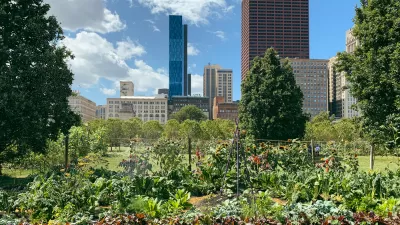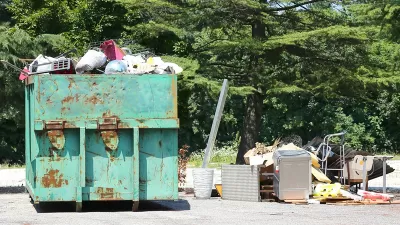Longtime residents say the city is not fulfilling its goal of keeping vacant parcels in the hands of locals as property values rise steeply.

Residents in Detroit's East Davison Village are finding it difficult to purchase vacant properties in their neighborhood, many of which are owned by the Detroit Land Bank Authority, reports Aaron Mondry, despite recommendations from the city’s own Planning and Development Department to sell vacant parcels to locals. The recommendations come from a 2019 framework that seeks to "stabilize a disinvested neighborhood while also getting land and housing back in the hands of community members who have few resources and plenty of skepticism."
"[L]ongtime residents of East Davison Village say the Land Bank is not following through on providing more property to people who have stuck with the neighborhood through tough times," selling properties instead to outside buyers with more resources. Meanwhile, "average sales price of homes in the area nearly doubled between January 2017 and July 2018, from $23,600 to $41,250." Residents say they would like to see investment go toward repairs on existing homes and a stronger commitment to helping locals acquire properties.
In 2020, seven residents, including Patricia Cortner, put together a cooperative purchasing proposal for nine homes, which they hoped to renovate incrementally and rent out to low-income tenants. The group proposed paying $1,000 per home and said it could demonstrate proof of funds for initial repair work. Soon after, the Land Bank told them none were available for purchase, but later put the majority of those properties up for public sale.
A report by Global Detroit, an advocate for Detroit’s immigrant communities, "recommended the Land Bank release more property to longtime residents, even if it means not every project is successfully finished." According to Global Detroit's executive director Steve Tobocman, "nine times out of 10, when it is sold to residents, they do a better job of maintaining it."
FULL STORY: Property values are rising. But these longtime Detroiters say they are missing out because of the Land Bank.

Planetizen Federal Action Tracker
A weekly monitor of how Trump’s orders and actions are impacting planners and planning in America.

Maui's Vacation Rental Debate Turns Ugly
Verbal attacks, misinformation campaigns and fistfights plague a high-stakes debate to convert thousands of vacation rentals into long-term housing.

San Francisco Suspends Traffic Calming Amidst Record Deaths
Citing “a challenging fiscal landscape,” the city will cease the program on the heels of 42 traffic deaths, including 24 pedestrians.

Defunct Pittsburgh Power Plant to Become Residential Tower
A decommissioned steam heat plant will be redeveloped into almost 100 affordable housing units.

Trump Prompts Restructuring of Transportation Research Board in “Unprecedented Overreach”
The TRB has eliminated more than half of its committees including those focused on climate, equity, and cities.

Amtrak Rolls Out New Orleans to Alabama “Mardi Gras” Train
The new service will operate morning and evening departures between Mobile and New Orleans.
Urban Design for Planners 1: Software Tools
This six-course series explores essential urban design concepts using open source software and equips planners with the tools they need to participate fully in the urban design process.
Planning for Universal Design
Learn the tools for implementing Universal Design in planning regulations.
Heyer Gruel & Associates PA
JM Goldson LLC
Custer County Colorado
City of Camden Redevelopment Agency
City of Astoria
Transportation Research & Education Center (TREC) at Portland State University
Jefferson Parish Government
Camden Redevelopment Agency
City of Claremont




























